GHG assessment: Constraints or opportunities for the company?

Achieving carbon neutrality by 2050 remains a major challenge for France. Today, companies are at the heart of a major environmental transition. The Greenhouse Gas Emissions Balance Sheet (BEGES), long perceived as a mere regulatory constraint, has now become an essential strategic tool. Initiated by the French Environment and Energy Management Agency (ADEME), this tool enables organizations to assess their carbon impact and orient their transition plan towards a more sustainable model.
While some companies still dread the constraints associated with GHG assessments - cost, complexity, adaptation - others see them as a real competitive lever.
By integrating effective methods for monitoring and reducing emissions, we can optimize resources, innovate and meet the growing expectations of consumers and partners in favor of sustainable development.
GHG assessment: Constraints or opportunities for the company?
1. The Bilan GES: a changing obligation
1.1 Definition and challenges of GHG assessment
1.2 Regulatory framework: constraints and legislative developments
1.3 Impact on the company: risks and obligations
2. Turning constraints into opportunities
2.1 Challenges to overcome: costs, complexity and adaptation
2.2 Performance drivers: cost reduction and innovation
3. GCI, a partner for a successful low-carbon trajectory
3.1 GCI support: from GHG assessment to implementation
3.2 How the FFBad is accelerating its transition with our expertise
Bilan GES: A changing obligation
The urgency of climate change calls for a profound transformation of business models. The Bilan GES is an essential tool for any organization wishing to measure and reduce its environmental impact. This system enables emissions to be assessed using a structured approach, based on the calculation of scopes 1, 2 and 3, which differentiates between direct and indirect emissions.
🗝️Définition and the challenges of GHG assessments
The BEGES is a measurement tool used to assess a company's carbon footprint by quantifying the emissions generated by its activities. It is based on recognized methodologies, such as those defined byADEME, and relies on international standards such as the GHG Protocol and ISO 14064.
The main objective of the GHG assessment is twofold:
- Enable an organization to better understand the origin of its emissions (Scope 1, 2 and 3) in order to implement reduction actions .
- Meet regulatory requirements and the growing expectations of stakeholders.
In a context where the ecological transition is becoming an imperative, this exercise is an essential lever for building an effective and sustainable action plan to reduce our environmental footprint.
⚖️Cadre regulations: constraints and legislative developments
Since the Grenelle II law in 2010, certain companies have been required to carry out a regulatory GHG assessment. This framework has been strengthened by the Climate and Resilience Act, which broadens the scope of companies concerned and imposes more stringent requirements in terms of monitoring and transparency.
Obligations vary according to company size and sector of activity:
- Companies with more than 500 employees in mainland France (250 in overseas territories) are required to carry out a GHG assessment every four years.
- Local authorities with more than 50,000 inhabitants and certain public establishments are also concerned.
- De nouvelles réglementations européennes, comme la CSRD (Corporate Sustainability Reporting Directive), impose des exigences accrues en matière de reporting extra-financier avec l’intégration du Scope 3. Découvrez notre accompagnement pour la confirmité à la CSRD.
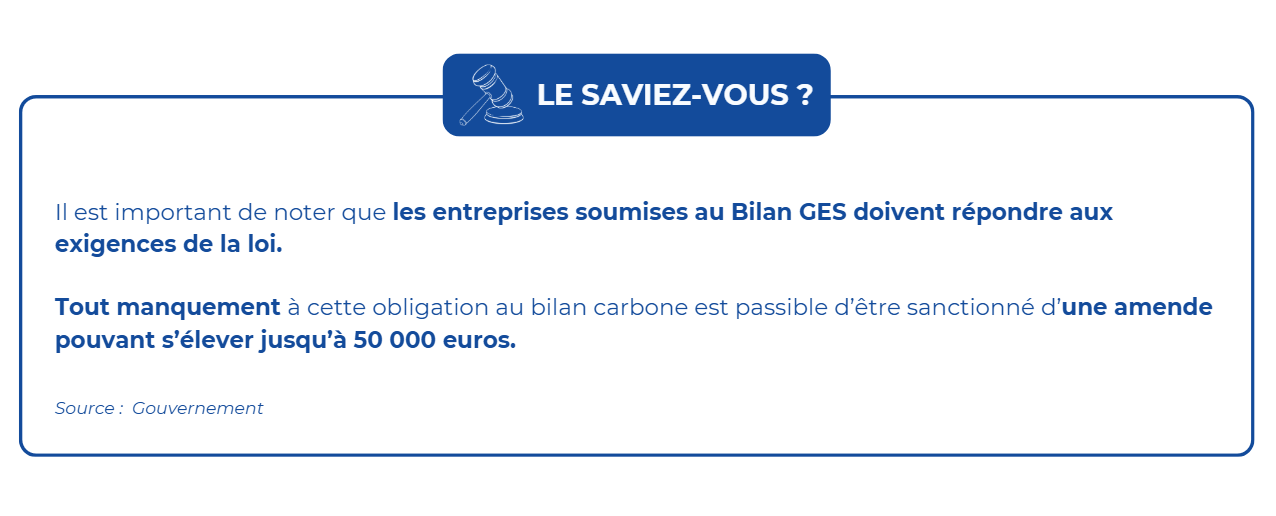
📢The impact on the company: risks and obligations
While GHG assessments are mandatory for some organizations, they are gradually becoming a strategic necessity for all. Beyond the regulatory framework, it meets several major challenges:
- Access to financing: More and more investors and banks are incorporating ESG (Environmental, Social and Governance) criteria into their decisions. A company committed to reducing its emissions can thus benefit from better financing conditions.
- Pressure from consumers and partners: Expectations of environmental responsibility are rising, and companies need to demonstrate their commitment to remain competitive.
- Anticipating future regulations: Preparing now means getting ahead of the game and avoiding the potential penalties associated with non-compliance with future obligations.
Far from being a mere administrative constraint, the GHG balance sheet is a genuine strategic tool for organizations wishing to make a lasting contribution to the ecological transition. However, its implementation can be a challenge, not least because of the costs and resources required to collect and analyze the data.
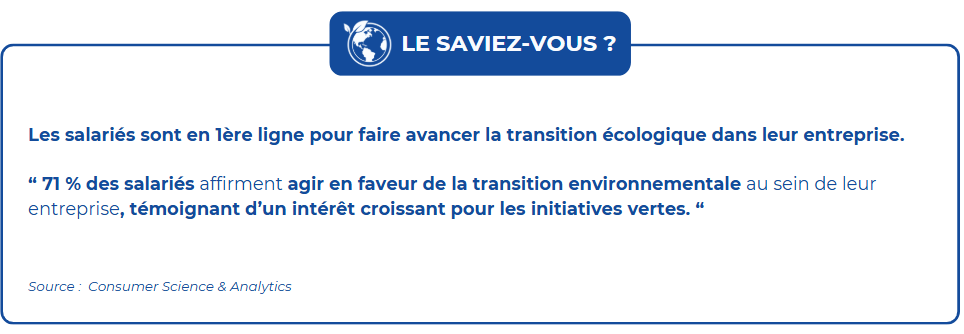
Turning constraints into opportunities
Adopting an innovative approach not only reduces yourenvironmental footprint, but also optimizes the management of your data and resources. This transformation involves all stakeholders, including your employees and internal processes, to build a more agile and resilient organization.
🚀 Challenges to overcome: costs, complexity and adaptation
Three main challenges often emerge when it comes to implementing it:
- The cost of implementation
Carrying out a GHG assessment requires financial and human resources:
- Data collection
- Analysis of results
- Drawing up an action plan
This can represent a substantial investment, especially for SMEs with limited resources.
- The complexity of the process
GHG assessments are based on rigorous methodologies, such as those proposed byADEME and the GHG Protocol.
Identifying and quantifying direct and indirect emissions (Scopes 1, 2 and 3) can be a technical and time-consuming task.
- Adapting to regulatory requirements and market trends
Environmental standards are becoming increasingly stringent, requiring constant monitoring to ensure compliance. What's more, the expectations of customers and partners are evolving, forcing companies to regularly review their carbon strategy.
Despite these obstacles, integrating a GHG assessment into your corporate strategy is not just a constraint: it's also a tremendous opportunity to rethink your business model and create value.
💡 A performance lever: cost reduction and innovation
Rather than being perceived as a burdensome obligation, the GHG emissions balance sheet (BEGES) can become a driver of transformation and performance for the company.
✅ Optimizing energy and operating costs
A well-executed GHG balance sheet
- Identifying the most emitting workstations
- The adoption of measures to reduce energy consumption, travel and waste.
Less energy consumption means lower costs, improved profitability and better control of financial risks (fluctuations in energy prices and future carbon taxes).
✅ Access to financing and competitive advantages
Banks and investors give greater preference to companies committed to a CSR approach. Committing to a low-carbon trajectory accompanied by a genuine, clear action plan can open the door to subsidies, green loans or tax breaks.
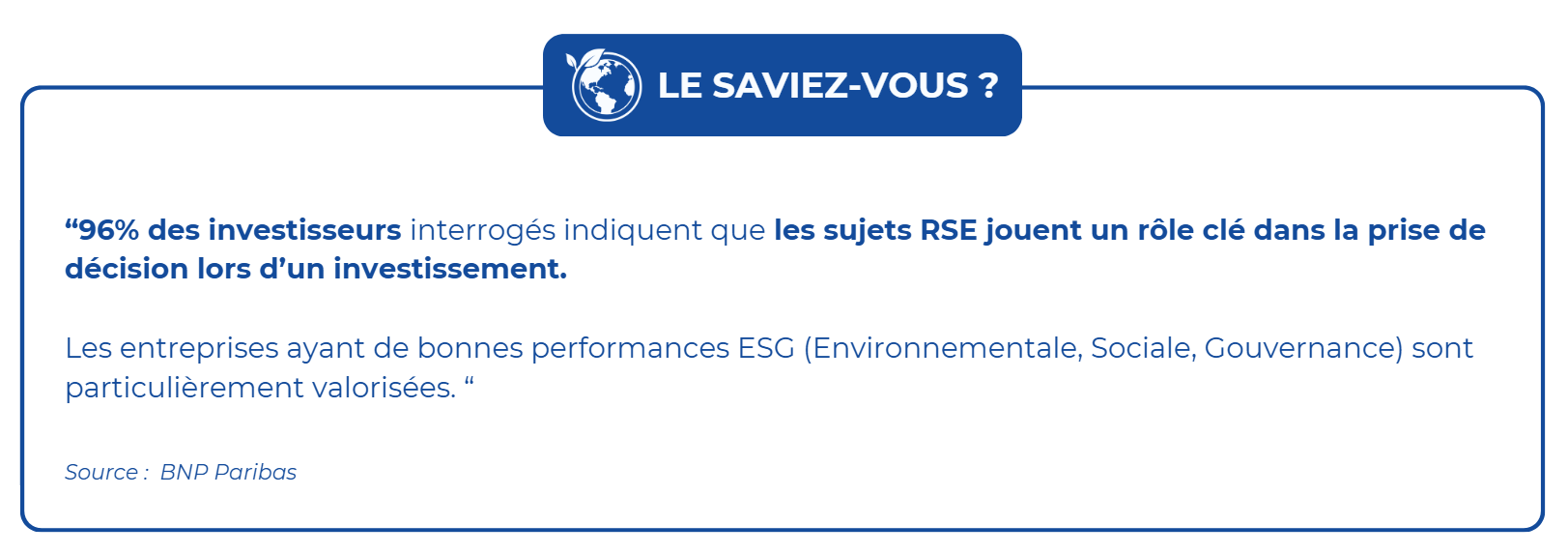
✅ Differentiating and strengthening brand image
Consumers' and partners' expectations are constantly rising. A proactive approach to reducing GHG emissions is becoming a powerful marketing asset.
Helping to enhance your reputation and win the loyalty of customers who want to buy responsible products and services.
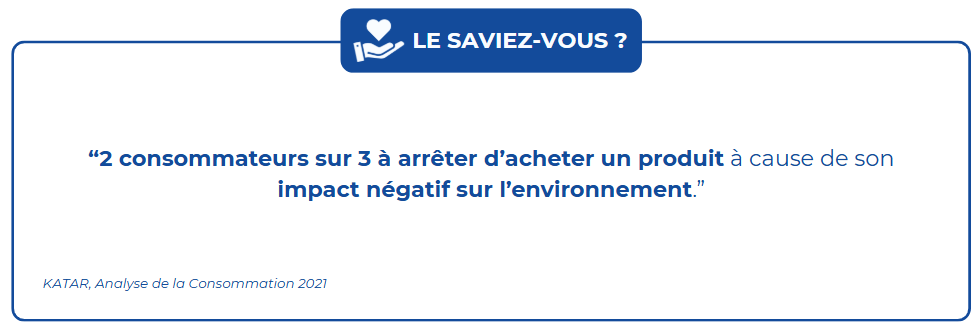
✅ Innovation and new business models
Companies are driven to innovate
- Rethink their production processes by integrating renewable energies
- Developing thecircular economy.
- Optimize their supply chain to open up new markets and create sustainable competitive advantages.
So, far from being a hindrance, the GHG balance sheet can become a real lever for growth and innovation. But to make the most of it, you need to be properly supported in this transition...
GCI, a partner for a successful low-carbon trajectory
To make a successful transition to a more sustainable economy, companies need partners who can provide effective support. GCI is a key player in this process, offering solutions adapted to each stage of decarbonization.
From GHG assessments to in-depth scope 3 analysis, GCI helps you identify your action levers with :
- Implementing ambitious strategies
- Reducing your sustainable carbon footprint
How to sustain and strengthen your business through a successful low-carbon trajectory.
✨How FFBad is accelerating its transition with our expertise
The French Badminton Federation (FFBad) is resolutely committed to a social performance approach, focusing on four fundamental pillars: health, education, eco-responsibility and inclusion.
This ambitious vision extends to all our regional structures, as well as our departmental committees and federated clubs. With this in mind, the Bilan GES has emerged as an essential tool. Perceived as a concrete means of assessing and reducing environmental impact, the BEGES offers a comprehensive approach to measuring greenhouse gas emissions.
To make this objective a reality, the FFBad chose the GCI platform, which we supported specifically on the environmental pillar.
In conclusion, well thought-out CSR communication is an essential lever for promoting a company's environmental commitments. Adopting a transparent approach means meeting the growing expectations of its stakeholders and strengthening its market position.
Implementing a responsible communications strategy aligns a company's actions with the challenges of sustainable development. Ensuring a successful low-carbon trajectory towards a more sustainable model.
We aim to meet ministerial requirements and guidelines by promoting more responsible sports and raising awareness among our members and the general public.
💯 GCI support: from GHG assessment to implementation
Global Climate Initiatives is the intelligent reference platform, 100% online.
For over ten years, GCI has been supporting entrepreneurs in their decarbonization strategy, from the preparation of GHG assessments to the deployment of action plans to reduce GHG emissions.
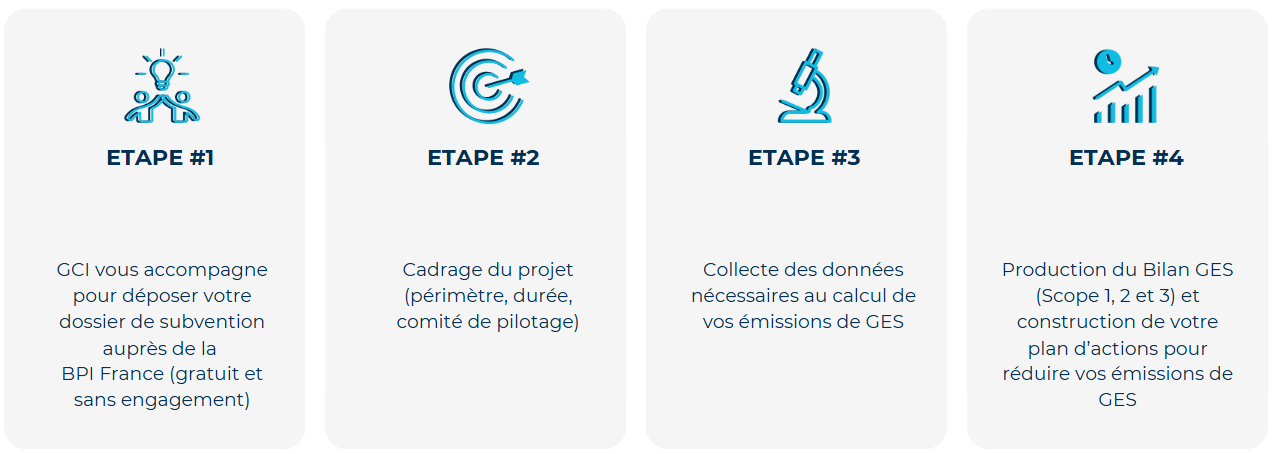
GCI's online platform provides the most complete range of tools for: Identifying, Measuring, Reducing greenhouse gas emissions, in complete autonomy.
By combining environmental performance, the circular economy and collective commitment, organizations can turn their climate ambitions into concrete, sustainable strategies.
With GCI's support, move from strategy to action by implementing solutions tailored to your challenges. Let's take action today to build a responsible, low-carbon future. 🌱
Our carbon experts will be happy to give you a free free demonstration of our platform. 🚀







